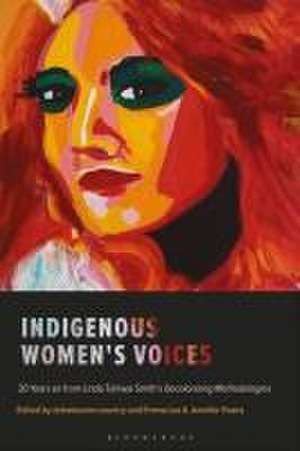Indigenous Women's Voices: 20 Years on from Linda Tuhiwai Smith’s Decolonizing Methodologies
Editat de Emma Lee, Jennifer Evansen Limba Engleză Paperback – 19 oct 2022
Preț: 135.69 lei
Nou
Puncte Express: 204
Preț estimativ în valută:
25.97€ • 27.76$ • 21.65£
25.97€ • 27.76$ • 21.65£
Carte tipărită la comandă
Livrare economică 17 aprilie-01 mai
Preluare comenzi: 021 569.72.76
Specificații
ISBN-13: 9781350374317
ISBN-10: 1350374318
Pagini: 272
Dimensiuni: 156 x 234 mm
Greutate: 0.42 kg
Editura: Bloomsbury Publishing
Colecția Bloomsbury Academic
Locul publicării:London, United Kingdom
ISBN-10: 1350374318
Pagini: 272
Dimensiuni: 156 x 234 mm
Greutate: 0.42 kg
Editura: Bloomsbury Publishing
Colecția Bloomsbury Academic
Locul publicării:London, United Kingdom
Caracteristici
Thirteen women in four countries offer their critical thinking that honors and recognizes the influence Linda's work has on their lives, as they share experiences of decolonizing work and strengthening Indigenous methodologies through research impact.
Notă biografică
Linda Tuhiwai Smith is Vice-Chancellor with responsibilities for Maori development at the University of Waikato, as well as Dean of the School of Maori and Pacific Development.Dr Emma Lee is a Trawlwulwuy woman of Tebrakunna country, north-east Tasmania, Australia. Her research fields over the last 25 years have focused on Indigenous affairs, land and sea management, natural and cultural resources, regional development, policy and governance of Australian regulatory environments. Dr Jen Evans is a Queer Dharug woman with dual connections to Dharug and palawa country. She is an Aboriginal Research Fellow at the University of Tasmania whose research an advocacy blends technology, country and queerness to create safe spaces for Indigenous methodological work.
Cuprins
About the editorsAbout the contributorsAcknowledgements Foreword Professor Linda Tuhiwai SmithIntroductionIndigenous women honoring 20 years of Linda Tuhiwai Smith's Decolonizing MethodologiesJennifer Evans & tebrakunna country and Emma LeePART 1: Country and Connection1 From the mountains to the sea: decolonizing rivers in Aotearoa New ZealandKaren Fisher2 Can men weave baskets?: the queering of lutruwita countryJennifer EvansPART 2: Violence and Safety3 Black panopticon: who wins with lateral violence? Jacinta Vanderfeen4 Blak & Salty: Aboriginal women reflect on lateral violence & racism in Australian universitiesDonna and Nikki Moodie, Kelly Menzel and Liz CameronPART 3: Wisdom and Knowledge5 Kei hea au e tu ana? Reflections on the journey to where I standKelly Ratana6 A Spoke in the wheel: Indigenous women and their stories as a decolonizing frameworkAngela BurtPART 4: De/colonizing Minds7 Indigeneity, Indigenous feminisms and IndigenizationLori Campbell8 Writing in the first person: reframing the academy for Indigenous voicesEmma LeePART 5: Seeing Ourselves9 Resist and assert - Indigenous resistance work and collecting institutions in AustraliaLauren Booker10 What form can an atonement take?Pauliina FeodoroffReflectionsDistinguished Professor Maggie WalterIndex
Recenzii
Decolonizing Methodologies: Research and Indigenous Peoples written by Linda Tuhiwai Smith is a seminal text that changed the way in which Indigenous research is contextualised in higher education. The editors, Emma Lee and Jennifer Evans have skilfully compiled a series of essays that pay tribute to Smith's work and in doing so demonstrate the longevity of influence and impact this work continues to have. The volume includes contributions from Aboriginal, First Nations, Maori and Sámi scholars opening with a forward by Linda Tuhiwai Smith herself and finishing with reflections from Palawa scholar Maggie Walter. The collection of essays is a celebration as much as it constitutes a scholarly text. The essays provide messages of Indigenous women's strength and endurance, love and joy. The collection speaks of Country and connections, of the difficult and complex navigation of colonial structures forced upon us and of our own wisdom and knowledge that sustains us to do this work. The book is not only a tribute to Linda Tuhiwai Smith's work, it is a tribute to Indigenous women across the globe and their tenacity to survive and build a legacy in the academy.
